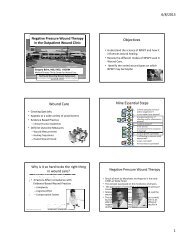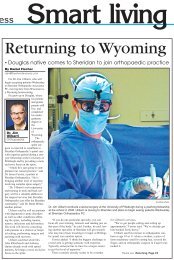Layout 1 (Page 1) - Sheridan Memorial Hospital
Layout 1 (Page 1) - Sheridan Memorial Hospital
Layout 1 (Page 1) - Sheridan Memorial Hospital
You also want an ePaper? Increase the reach of your titles
YUMPU automatically turns print PDFs into web optimized ePapers that Google loves.
Opinion<br />
THE<br />
Press SHERIDAN Friday,<br />
4<br />
May 16, 2008<br />
Israel is not a<br />
freedom franchise,<br />
Mr. President<br />
Don't know why I bother. The man is leaving office in<br />
eight months, his presidency noticeably marked by the<br />
uneven tread of the lame duck. But so long as George W.<br />
Bush is commander in chief, there remains something mesmerizing<br />
about the way he seems to experience his momentous<br />
tenure virtually unscratched, even ungrazed, by his<br />
many brushes (collisions) with history.<br />
I'm not suggesting callousness on his part regarding<br />
American casualties in the wars in Iraq and Afghanistan, or<br />
regarding American civilian casualties due to Islamic terrorism.<br />
I think he feels such losses very deeply. In fact, I<br />
think he feels everything very deeply. Whether the subject<br />
is his feelings about Mexican illegal aliens, the war in Iraq<br />
or on-off Supreme Court nominee Harriet Miers, I think<br />
Bush's presidency, at its base, has been an emotional presidency,<br />
more gut-driven and temporal<br />
than attuned to anything like<br />
that sweep of history you hear<br />
about.<br />
I point this out on reading the<br />
president's remarks in Israel to<br />
mark the 60th anniversary of the<br />
nation's statehood.<br />
"I suspect," Bush said, "if you<br />
looked back 60 years ago and tried<br />
Diana<br />
West<br />
Columnist<br />
to guess where Israel would be at<br />
that time, it would be hard to be<br />
able to project such a prosperous,<br />
hopeful land. No question people<br />
would have said, well, we'd be surrounded<br />
by hostile forces — but I doubt people would have<br />
been able to see the modern Israel, which is one reason I<br />
bring such optimism to the Middle East, because what happened<br />
here is possible everywhere."<br />
Let's run that last bit by again. The president says the<br />
singular experience of "modern Israel" is one reason for<br />
optimism in the Middle East "because what happened here<br />
(Israel) is possible everywhere."<br />
The jaw drops. On recovery, I suppose the most direct<br />
response to this statement, better suited to a beauty-pageant<br />
Pollyanna than a war-scarred president, is: No, Mr.<br />
President. What happened in Israel is not possible everywhere.<br />
Just for starters, what happened in Israel happened<br />
to a people whose monotheism and ethics, as Martin<br />
Gilbert writes in "Churchill and the Jews," was, in<br />
Churchill's view, "a central factor in the evolution and<br />
maintenance of modern civilization" — a central factor in<br />
liberty and democracy as the West still knows it.<br />
This is not, to understate the case, something that may<br />
be said about the Islamic rest of the Middle East. Besides,<br />
what happened in Israel — the modern incarnation of the<br />
ancient Jewish nation that today enshrines freedom of conscience,<br />
freedom of speech, rule of law, women's rights, etc.<br />
— is also anathema (anti-Islamic) to the Islamic Middle<br />
East, which to this day seeks or plots Israel's annihilation,<br />
not in what has become a sham territorial dispute, but rather<br />
to deny infidels (former dhimmis, to boot) a foothold in<br />
what Muslims regard as once-Muslim land.<br />
To President Bush, though, the un-Islamic conditions<br />
culminating in an anti-Islamic event — 60 years of infidel<br />
liberty — constitute a pre-fab democracy franchise that<br />
might just as easily have opened up in Riyadh or Baghdad<br />
as in Tel Aviv. I think he sees it this way because, emotionally,<br />
he wants to see it this way.<br />
So, why aren't we now celebrating 60 years of infidelstyle<br />
liberty in Saudi Arabia or Iraq?<br />
This must be an enduring puzzle to Bush, for just as he<br />
seems blind to the singular qualities of Judaism that root<br />
Israel within the Western tradition, he seems blind to the<br />
equally singular (but not overlapping) qualities of Islam<br />
that leave it outside. Distinguishing between the two traditions<br />
is the height of political incorrectness, let alone shattering<br />
to the multicultural vision of the Middle East that the<br />
Bush administration has made the basis of its democratization<br />
policy. All we need, the president will say just as he<br />
told Politico this week, is "the advance of freedom throughout<br />
the Middle East ... it's the best way to keep us secure."<br />
Since the overthrow of Saddam Hussein in 2003, that<br />
"advance of freedom" has mainly empowered Iran,<br />
Hezbollah, Hamas and the Muslim Brotherhood — not my<br />
idea of "secure." Of course, not my idea of "freedom,"<br />
either. But we're supposed to forget the fact that Westernstyle<br />
freedom is actually antithetical to Islamic law. In fact,<br />
we're supposed to forget about Islamic law. Given the<br />
administration's new lexicon that quashes most official references<br />
to Islam, we're supposed to forget about Islam, too.<br />
The president sure has. What happened here is possible<br />
everywhere. What happened everywhere is possible here.<br />
What's the difference when seeing what you want to see is<br />
believing?<br />
Diana West is a columnist for The Washington Times.<br />
She is the author of "The Death of the Grown-up: How<br />
America's Arrested Development Is Bringing Down<br />
Western Civilization," and has a blog at dianawest.net. She<br />
can be contacted via dianawest@verizon.net.<br />
Copyright 2008, Newspaper Enterprise Association<br />
Address The Press<br />
Write: The <strong>Sheridan</strong> Press, Box 2006, <strong>Sheridan</strong>,<br />
WY 82801<br />
Letters must be signed and include the<br />
address and telephone number of the author,<br />
and are used for verification only. Unsigned<br />
letters will not be printed. Letters should not<br />
exceed 400 words. Longer letters are published<br />
at the paper’s discretion. Letters are edited for<br />
length, taste, grammar, clarity and possible<br />
libelous material. E-mail to editor@thesheridanpress.com<br />
Letters<br />
City can afford tax cut,<br />
but not fire, ambulance pact?<br />
Editor:<br />
Mayor Kinskey has offered a $36 tax cut on property<br />
tax. With this cut, city residents would lose $632,000<br />
in revenue.<br />
City Assistant Clerk Mr. Badley has said, “If the tax<br />
cut passes, the city will have to reduce its budget.”<br />
What does this tax sneeze mean? Is this only election-year<br />
vote pandering, or has the mayor sneezed,<br />
and will the county catch the cold?<br />
The last time this mayor declared a revenue shortfall,<br />
the county residents lost ambulance and fire protection.<br />
I find it interesting that the city could not afford to<br />
continue the joint powers board fire and ambulance<br />
agreement, but the city can vote to create a budget<br />
shortfall.<br />
A shortfall that, if the budget were reduced for the<br />
city Public Works Department, might impact the<br />
<strong>Sheridan</strong> Area Water Supply Joint Powers Board.<br />
The city has never said that increased revenue from<br />
ad valorem tax on CBM production would allow for a<br />
mill reduction. Instead, the voters must believe this is<br />
tax relief.<br />
"What kind of America are we going<br />
to leave to our kids?" The question is the<br />
biggest cliche in American politics -- and<br />
the least seriously addressed major issue.<br />
Because, in fact, the now-retiring<br />
baby boom generation is passing on to its<br />
children an America buried in debt, woefully<br />
short on savings and investment and<br />
facing stupendous tasks we don't have<br />
any idea how to finance.<br />
The United States already ranks far<br />
behind its major economic competitors in<br />
health care outcomes, educational performance,<br />
environmental quality and<br />
national savings — threatening the country's<br />
world leadership and standard of living.<br />
The person who sounds the alarm<br />
about all this better than anyone else —<br />
and deserves to be vice president on<br />
either party's ticket — is David Walker,<br />
recently resigned as the head of the<br />
Government Accountability Office and<br />
now CEO of the Peter Peterson<br />
Foundation.<br />
A former Reagan administration official,<br />
Walker ran — and transformed —<br />
the GAO on an independent, bipartisan<br />
basis. He couldn't deliver any state or<br />
constituency, but he'd mark either party's<br />
presidential nominee as a determined,<br />
visionary reformer.<br />
From a fusty agency specializing in<br />
microanalysis and known as the General<br />
Accounting Office, Walker gave GAO a<br />
new name and turned it into a broadgauge<br />
investigator of waste and a tireless<br />
activist in the cause of economic sanity.<br />
Along with representatives from the<br />
Heritage Foundation, the Brookings<br />
Institution and the Concord Coalition,<br />
Vicki Taylor<br />
Banner<br />
Wants to recycle, but does not<br />
like soaking label off bottles<br />
Editor:<br />
We were enlightened to have the recycling representative<br />
come to Buffalo and speak of your new<br />
program.<br />
Because we in Buffalo do not recycle glass, milk<br />
jugs nor No. 1 water/soda bottles, I bring them to<br />
<strong>Sheridan</strong>. Up to this time, for the past 10 years, I<br />
took them to Gillette as a matter of stewardship.<br />
Having lived in several states over the past 25<br />
years, I have experienced many responsible recycling<br />
programs; however, they have not determined<br />
labels need to be removed.<br />
It is cumbersome having your sink filled every<br />
day trying to soak off labels from bottles and jars.<br />
Could you not include this task in your recycling<br />
program as other municipalities have? I am sure you<br />
would have a better response from residents.<br />
Walker traveled the country on<br />
a "fiscal wake-up tour" to make<br />
people aware of the unsustainability<br />
of America's long-term<br />
finances.<br />
The killer statistic that tour<br />
participants emphasized was<br />
that, by 2040, three federal programs<br />
— Social Security,<br />
Medicare and Medicaid, plus<br />
interest on the national debt —<br />
are scheduled to consume 20<br />
percent of gross domestic product,<br />
or what the federal government<br />
now spends for all its functions.<br />
That's practically a dictionary definition<br />
of "unsustainable." It means that the<br />
next generation of workers will have to<br />
have its taxes more than doubled.<br />
In reams of reports and pungent<br />
speeches, Walker has struck a loud series<br />
of gongs about all levels of debt and<br />
unfunded obligations, the challenges of<br />
an aging population and the consequences<br />
of inaction. He also outlined proposed<br />
solutions — all politically difficult.<br />
Walker's principal mantra is "no more<br />
entitlement programs that are not paid<br />
for." Last week he denounced congressional<br />
plans to spend $52 billion over 10<br />
years on a new GI bill guaranteeing college<br />
benefits to veterans.<br />
"No matter how laudable the purpose<br />
or well-intentioned the program," he said,<br />
"if it's that important, we ought to pay for<br />
it."<br />
He also declared the Medicare prescription<br />
drug bill passed in 2003 "the<br />
most fiscally irresponsible legislation in<br />
decades."<br />
The easiest-to-understand level of<br />
Carole Shelby<br />
Buffalo<br />
"national debt" is "debt held<br />
by the public" — the accumulation<br />
of federal fiscal<br />
deficits. This number has<br />
climbed during the Bush<br />
administration from $3.4<br />
trillion to $5 trillion — or<br />
36.8 percent of the gross<br />
domestic product.<br />
According to the GAO,<br />
that will rise to 62.7 percent<br />
of the GDP by 2020 and 250<br />
percent by 2040. The highest<br />
that figure has ever reached<br />
was 109 percent in 1946.<br />
As Walker pointed out to me in an<br />
interview, post-World War II U.S. debt<br />
was all owed to Americans. Now, half of<br />
it — and 75 percent of new debt — is<br />
owed to foreigners.<br />
But there are other measures of excessive<br />
debt accumulated by the United<br />
States. As of March 2008, the federal<br />
government's total outstanding debt,<br />
including sums owed by Social Security<br />
and other trust funds, was $9.4 trillion, up<br />
from $5.6 trillion when Bush took office.<br />
Then there is the total of long-term<br />
obligations incurred by current federal<br />
law — mainly retirement benefits and<br />
Medicaid for the poor — which comes to<br />
an astounding $53 trillion over the next<br />
75 years, representing 90 percent of the<br />
total net worth of American households,<br />
or $175,000 per person or $410,000 per<br />
full-time worker.<br />
Piled on top of all that comes<br />
America's huge trade imbalance and the<br />
personal debt — and lack of savings — of<br />
ordinary citizens that used to be offset by<br />
rising home values but no longer is.<br />
Equestrian Hills Homeowners<br />
thank MDU for gas pipeline<br />
Editor:<br />
Thank you, MDU!<br />
Over the past few months we had contracted with<br />
Montana-Dakota Utilities for the installation of a natural<br />
gas pipeline to the property owners within our subdivision<br />
as well as to the Big Horn Events Center.<br />
Our working relationship during this project with<br />
the utility company and its supervisor, Mr. William<br />
Pettit, was outstanding, and we are greatly indebted to<br />
both Mr. Pettit and his company for all their good<br />
efforts.<br />
From the early planning stages, when Mr. Pettit<br />
made a thorough presentation to our homeowners,<br />
until the final installation of the gas line, this project<br />
was completed competently, carefully, and expeditiously.<br />
Thank you, Mr. Pettit, and all those who worked<br />
with you, for making this valuable addition to our subdivision<br />
such a rewarding and pleasant experience.<br />
Beverly Anderson, Bruce Burns, Jill Scott,<br />
Paul Schwartz, Ray Usher<br />
Board of Directors, Equestrian Hills<br />
Homeowners’ Association<br />
Big Horn<br />
To get U.S. priorities right,Walker should be our next VP<br />
Morton<br />
Kondracke<br />
Columnist<br />
"We've not only burdened our children<br />
with debt," Walker told me, "but<br />
we're not investing in them. We're not<br />
investing in them, but we expect them to<br />
pay the bills."<br />
A just-issued report by the children's<br />
advocacy group, First Focus, shows that<br />
federal outlays for children's programs<br />
have increased by only $2.8 billion in the<br />
past four years, while spending for seniors<br />
increased by $140 billion.<br />
As Walker put it in a recent speech,<br />
"current fiscal policy is creating an unfair<br />
and unethical relationship between<br />
today's citizens and tomorrow's taxpayers.<br />
Baby boomers and current retirees<br />
benefit from today's higher spending and<br />
lower tax policies, while our children and<br />
grandchildren will be expected to pay the<br />
bill for today's excessive consumption."<br />
Walker advocates a series of reforms,<br />
starting with shaving future entitlement<br />
benefits, controlling health care costs and<br />
changing the tax code to reward savings<br />
and investment.<br />
He'd be a challenge for either party's<br />
ticket or administration. And yet, Walker<br />
has the best strategy of anyone to answer<br />
the question: "What kind of America will<br />
we leave to our kids?" It's really the most<br />
important question of the 2008 election.<br />
If the next president won't nominate<br />
Walker — as I expect — then he or she<br />
emphatically should listen to him.<br />
(Morton Kondracke is executive editor<br />
of Roll Call, the newspaper of Capitol<br />
Hill.)<br />
Distributed by Newspaper Enterprise<br />
Association


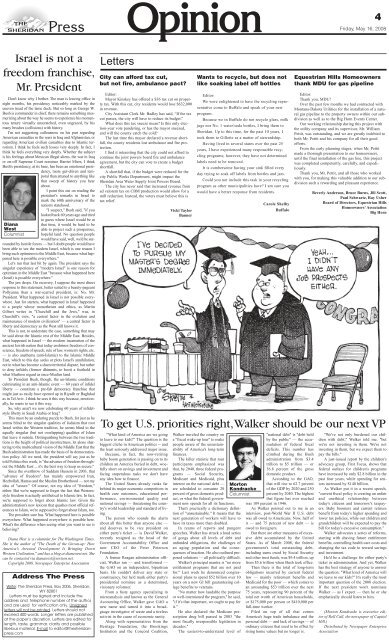

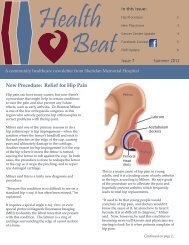

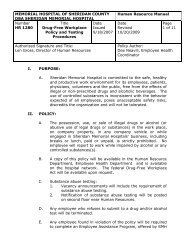

![Adult - Medical History Form [PDF] - Sheridan Memorial Hospital](https://img.yumpu.com/40577874/1/190x245/adult-medical-history-form-pdf-sheridan-memorial-hospital.jpg?quality=85)

